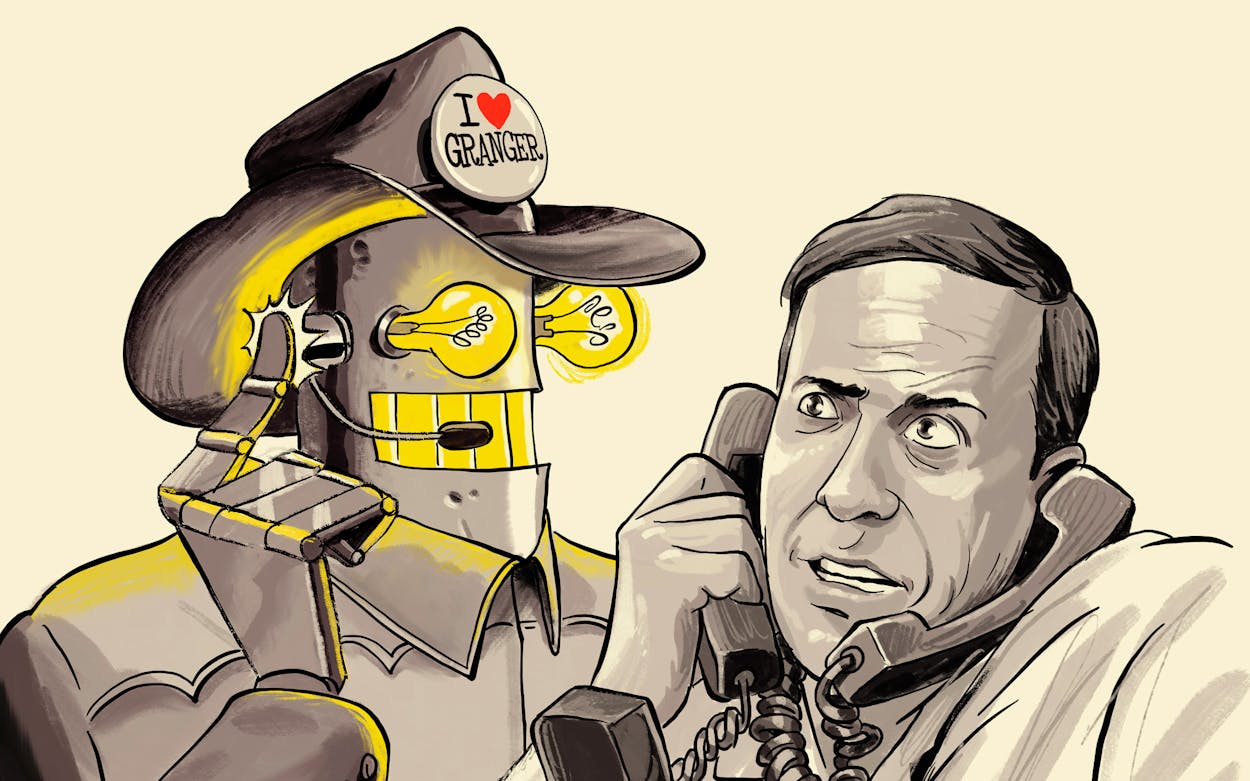Q: I love small-town Texas, but I’ve recently noticed that the majority of spam calls I get on my cellphone come from numbers in small or even tiny Texas towns like Granger, Mentone, Sour Lake, and so forth. What is the deal with all the spam calls originating in small Texas towns?
Bess Bass, Houston
A: The Texanist hates spam calls! But, like you, he loves small Texas towns. In fact, the Texanist is arguably the product of such a place, having been born and reared in the small-ish Central Texas town of Temple. Though his hometown presently boasts a population of some 75,000 souls and more stoplights than anyone would care to count, it was much more diminutive back when the Texanist roamed its dusty streets. And it has always been surrounded by authentically small hamlets of the one-horse (or even no-horse) variety.
As such, the Texanist early on became acquainted with the quaintness for which these sorts of locales are beloved. For instance, the Texanist has fond memories of countless visits to such bucolic burgs as Salado, where the Texanist partook in creek swimming; Heidenheimer, where the Texanist’s mom occasionally visited an old friend; Zabcikville, where the Texanist’s mom procured her pickling cucumbers from a nice old Czech woman; Little River-Academy, where the Texanist attended Saturday-night dances; Westphalia, where the Texanist also attended Saturday-night dances; as well as uncountable other little specks scattered out across the blackland prairie, where the Texanist did all sorts of things that he will not deign to mention at this late date.
Back in the day, the Texanist’s Uncle Wilson even ran an old-timey gas station in Holland, located on Texas Highway 95 southeast of Temple, which the Texanist recalls for its free Cokes and Rockwellian backroom domino games that were frequented by old-timey Rockwellian farmers. The Texanist’s connection to small-town Texas is such that he even grew up hearing tales of his granddad having played a hand in the naming of Bell County’s teeny Red Ranger, an agrarian outpost of perhaps a dozen agrarians that shares a name with a once-popular brand of cigars likely distributed by the Texanist’s granddad’s grocery distributorship. When it comes to small Texas towns, the Lone Star State’s number one purveyor of fine advice knows of what he speaks.
Which is why the Texanist, who has himself noticed an uptick in robocalls boasting small-town Texas phone numbers, has been wondering the same thing you’ve been wondering: How could such lovely little locales be the origin point of so much annoying phone spam? The Texanist, in all his experience with small-town Texas, doesn’t remember ever encountering anybody whom he’d peg as the phone scammer type. Though, to be honest, he’s not exactly sure what the telltale signs would be. A sharkskin suit? An ashen complexion? Shifty eyes? An old toothpick or wooden match dangling from the lip? But then the Texanist remembered that he grew up in Temple in the sixties and seventies and not in a Depression-era Max Fleischer cartoon and reminded himself that in real life villains don’t always twirl their mustaches or connivingly rub their hands together. Regardless, something’s just not adding up.
For answers, the Texanist decided to go straight to the top and reached out to the Federal Communications Commission, the relevant D.C.-based regulatory entity. It was there that he found friendly and helpful Paloma Perez, the press secretary to the agency’s acting chairwoman. Perez, as luck would have it, not only shares a Christian name with one of the Texanist’s favorite libations, she also happens to be a native of small-town Texas, originally hailing from Dripping Springs, outside of Austin.
After the gist of the question at hand was communicated to her, Ms. Perez offered the Texanist some reassuring information. It turns out that those calls that appear to originate from Granger and Mentone and Sour Lake and Bronte and Kermit and Martinsville and so forth likely originate from somewhere else entirely. Via a crafty technological advance known as “caller ID spoofing,” Perez explained to the Texanist, scamming misfeasors are able to obscure the locales from which they are robocalling. So when someone with designs on stealing one’s money and/or identity calls from the dark underbelly of, say, New York City, they are able to make it appear to your caller ID that they are instead calling from, say, friendly ol’ Granger.
Trying to fool Texans into thinking they’re receiving calls from Texas towns is an example of what is referred to as “neighbor spoofing,” and it’s just another technique used by scammers to try to get an unsuspecting person on the line—figuratively and literally. Folks who live in, say, Denver, likely get many calls “from” Ouray and Trinidad and Woodland Park. Likewise, the perpetually tanned residents of Miami no doubt hear quite often from Apalachicola, Cedar Key, and Dunedin. “Scammers are relying on your friendliness and betting you are more likely to take a local call just in case it is someone you know,” Perez says. So perhaps our small-town Texans are off the hook. (So to speak.)
Or are they? Just as the Texanist was feeling heartened at learning that it was not, in fact, our fellow Texans who have been trying to telephonically swindle us, Perez informed him that just this last March the FCC levied the largest fine it has ever levied—$225 million—against a pair of robocallers based in, of all places, Houston. Yes, Houston is the least smallest town in Texas, and the fourth least smallest town in the whole county. Which is to say, it is not a small town at all. But, still, it is a Texas town and, in fact, the town where you live, Ms. Bass. Thus, the news does smart a bit.
Perez, who has lived outside of Texas for a decade and currently resides in the D.C. area but has maintained a Texas area code on her cellphone, tells the Texanist that she, too, gets frequent unwanted calls from tiny Texas towns—as well as tiny Virginia towns. Her advice on what to do when the phone rings and it’s a call from, say, Paducah, when you’re not expecting a call from anybody in Paducah? “Don’t answer calls from unknown numbers. Let them go to voicemail. If you do answer and think that the call may be an attempted scam, don’t hang on, hang up. Then file a complaint with the FCC Consumer Complaint Center by selecting the ‘phone’ option and then selecting ‘unwanted calls.’ The data we collect helps us track trends and supports our enforcement investigations,” Perez said.
So, there you have it, Ms. Bass. The Texanist sincerely hopes that your faith in small-town Texas has been restored. At the same time, he worries that your faith in the big city in which you live may be shaken. If this is the case and you, by chance, find yourself thinking that it is indeed time to pack up and move somewhere else, the Texanist would like you to know that he recently spoke with a fellow from Marble Falls who represents a buyer who is looking to purchase a home in your neighborhood and is willing to make a straight cash offer right now if you would only be so kind as to share some basic financial information. Apparently, all he requires is—
Hello? Ms. Bass? Ms. Bass? Are you there, Ms. Bass? Oh, well. Thanks for calling.
Have a question for the Texanist? He’s always available here. Be sure to tell him where you’re from.
- More About:
- The Texanist
- Temple
- Houston









